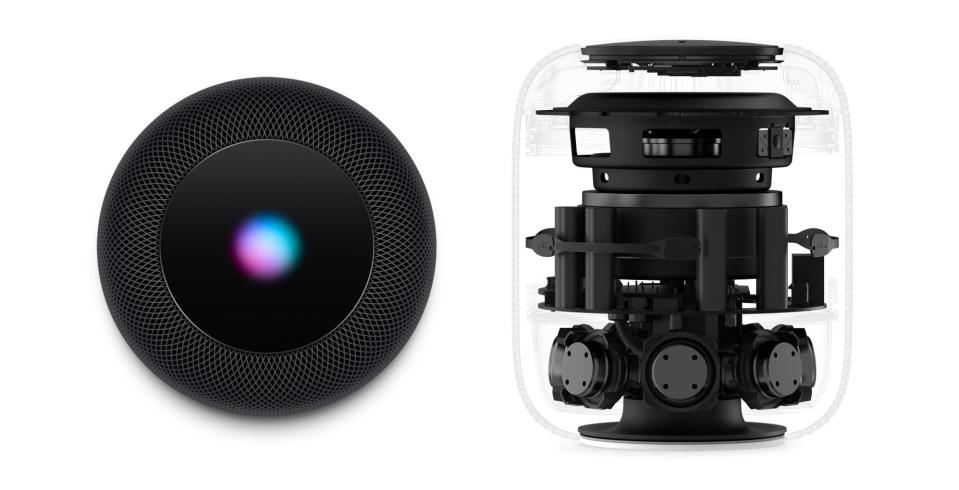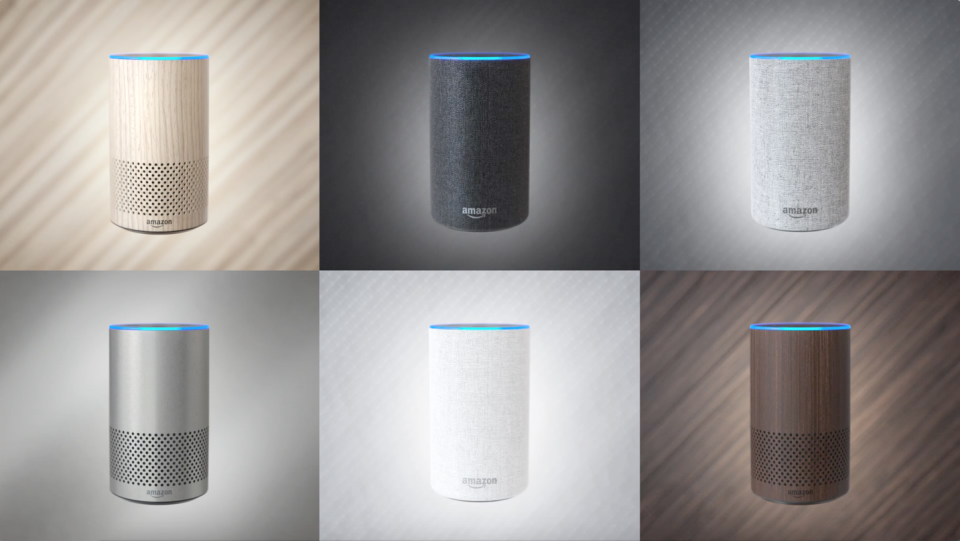Apple Slashes the HomePod's Price. Does Anyone Care?
Apple (NASDAQ: AAPL) recently cut the prices for its HomePod smart speaker worldwide. It reduced the speaker's U.S. retail price 15% from $349 to $299, and by as much as 18% in certain markets in Europe and Asia.
The price cuts weren't surprising, since the HomePod costs much more than Amazon.com's (NASDAQ: AMZN) Echo devices and Alphabet's (NASDAQ: GOOG) (NASDAQ: GOOGL) Google Home speakers. Amazon's Echo Dot and the Google Home Mini both cost about $40.

Image source: Apple.
Strategy Analytics claims that the HomePod's global market share fell from 4.9% to 4.1% between the third and fourth quarters of 2018. During the same period, Amazon's share rose from 31.8% to 35.5%, and Google's share climbed from 22.8% to 30%.
According to Strategy Analytics, Apple shipped just 1.6 million HomePods in the fourth quarter, indicating that it remains a niche product even for iPhone users. By comparison, the company shipped 9.2 million Apple Watches in the same quarter. Will cheaper HomePods help the device gain more traction, or is it a lost cause?
Why Apple launched HomePods
Apple launched the HomePod last February as a late entrant in the smart-speaker race. Amazon created the market when it introduced its first Echo in 2014, and Google followed suit in 2016.
Research organization Markets and Markets subsequently estimated that the global smart-speaker market would grow from $2.7 billion to $11.8 billion between 2018 and 2023. Bullish forecasts like this likely convinced Apple that it also needed a smart speaker.
Apple tried to accomplish three things with the HomePod. First, it attempted to diversify its hardware lineup away from the iPhone, iPad, and Mac. The organization's dependence on the iPhone is particularly worrisome, as iPhone sales fell 15% year-over-year last quarter but still accounted for 62% of its top line. Second, Apple saw an opportunity to expand Siri's ecosystem into smart homes by tethering connected devices to the HomePod.
Lastly, a smart speaker offering could help expand Apple Music, one of the core growth engines of the company's services division. Apple's services revenue rose 19% last quarter against the prior-year period and accounted for 13% of its top line; the company hopes such expansion will eventually offset the slower growth of its hardware devices.
Why are more people buying Amazon's Echo speakers?
Apple's HomePod strategy was questionable from the start. Many consumers scoffed at the $349 price tag, since Amazon's and Google's devices are much cheaper. Amazon and Google also are branching into a wider range of devices with different features at multiple price points.

Image source: Amazon.com.
Amazon's Echo Dot was aimed at entry-level consumers, but it also offered better sound in the $100 second-generation Echo and $150 Echo Plus, and added video screens with the $130 Echo Spot and $230 Echo Show. Google's higher-end Home speaker costs $130, and its Home Hub, which sports a video screen, costs $150.
Simply put, Apple was trying to sell a device with fewer features at a much higher price, and promote the HomePod as a high-end wireless speaker for audiophiles, although consumers could already buy high-quality speakers for less than $250.
The HomePod's second major flaw was its lack of a compelling ecosystem. Amazon's devices were tethered to its Alexa virtual assistant, Prime media services, e-commerce marketplace, and other services. Google's speakers used Google Assistant, which could access the company's search engine, cloud-based services, and Chromecast streaming devices.
In contrast, HomePods only had Siri, which was confined to a smaller selection of services than Amazon's or Google's speakers. The HomePod also lacked standard Bluetooth connectivity and could only be set up with an iOS device, which made it useless for Apple Music's Android subscribers.
Still not cheap or useful enough
Apple is reportedly developing a more affordable version of the HomePod, so it might be gauging the overall market response to cost-effective speakers with its latest price reductions. However, I'm skeptical the cuts will go deep enough, moreover, the HomePod still offers far fewer features than Amazon's and Google's devices.
If Apple really wants a piece of the smart-speaker market, it must sell significantly cheaper devices that are tethered to more third-party services. However, it's doubtful that it will adopt these tactics, since they contradict the company's long-term strategy of selling pricier devices which corral users into a walled product garden.
More From The Motley Fool
John Mackey, CEO of Whole Foods Market, an Amazon subsidiary, is a member of The Motley Fool's board of directors. Suzanne Frey, an executive at Alphabet, is a member of The Motley Fool's board of directors. Leo Sun owns shares of Amazon and Apple. The Motley Fool owns shares of and recommends Alphabet (A shares), Alphabet (C shares), Amazon, and Apple. The Motley Fool has the following options: short January 2020 $155 calls on Apple and long January 2020 $150 calls on Apple. The Motley Fool has a disclosure policy.
